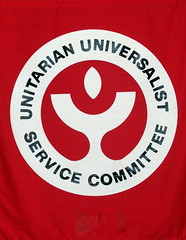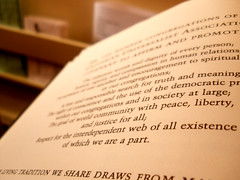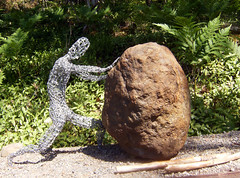 Photo by Chris Gin
Photo by Chris GinHere it is 11am on Friday and I am still sitting in the bus typing on my computer. I am "supposed" to be, according to the schedule, in the second half of my chosen "UU University" track, "Theology for a secular age." And, actually, I would like to be there -- I really enjoyed the first half, held from 1-6 yesterday afternoon.
I was already feeling some guilt from having missed opening ceremonies and in-gathering Wednesday evening, although then I had a better excuse, which involved an obligation of hospitality. When I got home much later than anticipated last night (more on this in a moment), I gave myself permission to sleep in just a little, telling myself that no real harm would come of missing, perhaps, the first hour of the track. That, I think, was the beginning of the end.
Louise, who is also in the Theology track, was feeling so exhausted and crummy last night, that she bailed out of the convention center right after the candidates' forum, even though we had tickets for the farewell cocktail party for outgoing president Bill Sinkford. So she, too, slept in this morning, and, uncharacteristically, I was up first. We might well have made it to the Salt Palace by 9:30, thus missing 90 minutes of our four-hour session, had we not both launched into UU-blogger overdrive as a result of three blistering comments left here early this morning.
It is, perhaps, poor judgment on my part to take action on such matters before my first cup of coffee has kicked in (and how do Mormons function in the morning, anyway -- Postum just doesn't cut it, IMO). But the comments were inappropriate and distracting, and so I deleted them, which took all of perhaps 30 seconds. The problem with that, of course, is that in typical over-apologetic UU fashion I then felt the need to explain my actions to all our readers, and that took something closer to an hour. By then, we looked at the clock and realized that we would catch, at most, an hour of our track before it ended, then come right back here for lunch (we need to walk the dog a couple times each day, so taking all our meals on-site is not in the cards). As much as I enjoyed the first half, we conceded defeat and decided to just remain home through the lunch hour.
Further compounding the guilt associated with all this (yes, I'm a UU, but I grew up Catholic -- guilt is second nature), I had allowed to the CLF staff when I went by the booth yesterday that we were having difficulty finding any free hours in the schedule to do our booth duty, another part of our delegate commitment along with this blog. So in addition to feeling bad about missing our session, I can also beat my breast and say I
could be sitting in the booth right now. Oh well.
I do have to remind myself periodically that, even though we have certain commitments to meet as delegates, we did get here on our own nickle, are coughing up $200 for this camp site in order to attend, and paid the $700 registration out of our own pockets. So, at some level, what we do with our time outside of Plenary sessions (which we consider mandatory) is really our own choice. So I suppose that missing the second half of our track is really just a waste of part of our conference fee.
As long as we made the choice to stay home for the morning, though, I am taking the opportunity to catch up on my reporting. Seriously, we are completely overbooked when we are here at GA (making me wonder why we thought sitting through UU University in the first place was a good idea), and even finding the time to update this blog is a challenge. If I don't do it regularly, though, I find that I lose track of everything I wanted to report.
As I wrote here yesterday, our day started with Plenary-II, wherein no business was conducted but we did have a pleasant worship service followed by an introduction to UU University. Apparently, while previous UU University sessions have been well received, two concerns led to the decision to include the UU University program into the GA general program this year, unfettered by competing scheduled activities. The first was a desire to bring UU University to a much broader audience, and the second was a complaint that many could not find a way to schedule both.
While I admire the motivation, and this was, perhaps, a good first effort, I do have some concerns about the format. We spent five hours in UU University yesterday, from 1-6. Even with two half-hour breaks (so, OK, it was really four hours), that's a long time to be couped up in a single venue with uncomfortable chairs. This morning's piece was another four hours, and spending that much more time in the same chair in the same room is definitely not something I missed by skipping this morning's session. I believe that breaking things up into shorter blocks spread across more of the schedule would have been preferable.
I will also say that, out of six tracks, five were focused on congregational issues that, while not irrelevant to CLF, are difficult to translate to the ethereal realm in which CLF operates. This is why we both ended up together in the sixth track (normally, our sensibilities suggest a divide-and-conquer strategy, wherein we deliberately choose separate activities to increase the breadth of our experience as well as our reporting here).
After Plenary we had, as always, a wonderful CLF worship service led by Rev. Jane Rzepka. When you have one worship service a year, you always make it a good one. This year's service featured a homily from Rev. Bill Schulz and music from a very talented group of soon-to-be credentialed (the very first ones!) musicians led by Sarah Dan Jones.
We had one more session before lunch. Louise had choir practice, and I chose to attend a session on The Path to Immigration Reform, introduced by Rev. Abhi Janamanchi. Apparently, featured speaker Kim Bobo was unable to attend due to a last minute conflict, and in her place Alexia Salvatierra, a Lutheran minister from Clergy and Laity United for Economic Justice, gave a very interesting presentation on how current immigration policy is tearing apart immigrant families, ripping children from their parents and presenting lawful US residents with a Hobson's choice of following deported members to Mexico or living apart.
The other speakers were somewhat drier, and I found the session as a whole to be very monotonous. I also felt that the "path" implied by the title was not really laid out -- the problem was well explained, but what we, as individual UUs or as congregations, can do to help, apart from the usual advice to hound your legislators, was not made clear. Episcopal minister Rev. Canon Pablo Ramos did a great job exposing the problem in the Salt Lake area, but failed to explain how UU's from elsewhere in the country can help. Also, clergy from other denominations did not appear to be well-briefed on the possibly non-Christian or even non-theistic makeup of part of their audience.
We squeezed in a round trip to the bus for lunch and a dog walk into the allotted hour, and were back in time to start our UU University track. I'm afraid I just don't have it in me to summarize that here, other than to say that I found the speaker, Rev. Galen Guengerich (pronounced, as far as I could make out, the same as former house speaker Newt), from All Souls New York, to be entertaining and engaging. The program is available on DVD if you are interested, and we are thinking about getting one so we can pick up what we missed this morning.
We had just an hour for dinner between the 6pm end of the session and the 7pm candidates' forum. The University track ended with a worship service, and just like my "bad Catholic" days, we sneaked out early to beat the dinner rush. We walked in to Olive Garden across the street at quarter to six and were seated immediately -- when we walked back out at 6:30 there was a line of UU's out the door.
The candidates' forum was, to date, the most informative (if not engaging) element of GA. This was the first time either of us had heard either candidate speak, and I have to agree completely with Louise's earlier post on this matter -- neither of these candidates will fill the shoes vacated by Bill Sinkford. I, too, am leaning towards one candidate -- not the one towards whom I was leaning when we arrived. I do not want to overshare on this matter just yet -- stay tuned. I also intend to consult with some of the CLF congregational leadership before making a final decision and casting my ballot.
In addition to hearing from the two presidential candidates for about 25 minutes apiece, we heard from the candidates for the two uncontested positions, Moderator and Financial Consultant, for a few minutes each. Gini Courter and Dan Brody are perfect fits for their respective positions, and I can share that I'd vote for each of them even in a contested race.
After the forum, Louise was absolutely wiped out and went home, leaving me to carry the torch to the final donors' reception on Bill Sinkford's watch, making it something of a farewell party for him. Several carefully chosen speakers had a couple minutes each to share their memories of Bill's presidency (and candidacy), including CLF's own Denny Davidoff. And then we were all treated to a surprise, the Sinkford's included, when
The Persuasions entered the room singing. Apparently, this is Bill's all-time favorite group, and, courtesy of a handful of "angel" donors, a group of leadership that knew this about him arranged for this surprise farewell gift.
The Persuasions launched into an extensive set, and I left after perhaps the tenth number. The song list was apparently culled from Bill's favorites by some stealthy means that I did not entirely follow. By the time I left, the entire party was dancing in the aisles.
That put me home sometime past 11, which brings this story full circle. In a few minutes, we are off to the next Plenary.
















